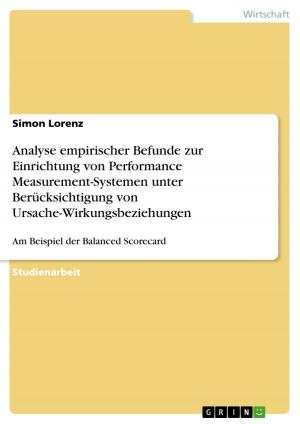Cultural Globalization and the exchange program 'Erasmus'
An institutional and cultural homogenization?
Nonfiction, History, Eastern Europe| Author: | Kathrin Eitel | ISBN: | 9783640902675 |
| Publisher: | GRIN Verlag | Publication: | April 29, 2011 |
| Imprint: | GRIN Verlag | Language: | German |
| Author: | Kathrin Eitel |
| ISBN: | 9783640902675 |
| Publisher: | GRIN Verlag |
| Publication: | April 29, 2011 |
| Imprint: | GRIN Verlag |
| Language: | German |
Essay aus dem Jahr 2010 im Fachbereich Kulturwissenschaften - Osteuropa, Istanbul Teknik Üniversitesi (-), Sprache: Deutsch, Abstract: The European Union's exchange program, which gains a better exchange not only on individually, but also on institutionally and especially Europe wide level, has been a alive for over 25 years now. But what exactly are the aims of the European Union, introducing such a program. Was there intention to achieve a cultural and institutional homogenization, in order to strengthens on a new 'europeanized' culture? To examine this question, I first introduce in the program of Erasmus, stressing particularly on the aims of it. In the following chapter I build up the connection to the globalized world, the definition of a globalization, which is in general economical considered, and aspect of a so called 'Europeanization'. The next chapter concentrates on the analyzing of various aspects first of a possible institutional homogenization, especially under consideration of the Bologna Process and some consequently problems. Secondly, we have to ask if the European Union also aims a cultural homogenization, in order to strengthens the cultural and geographical boarder in a world, in which modernity and globalization is ruling. My wrote this essay, mainly the first chapter, in accordance to the web presence of the European Commission and of the European Union. Furthermore I used Ulrich Teichler's article in the Journal of Studies in International Education, as well as his co-work with Baiba Rivza 'The Changing Role of Student Mobility', in which they describe the upcoming problems after Bologna. Walter Demmelhuber, who wrote comparative about 'European Educational Policy related to Academic Mobility', as well as comparisons to Benedict Anderson, Arjun Appadurai and Joseph Steglitz will be used as secondary literature.
Essay aus dem Jahr 2010 im Fachbereich Kulturwissenschaften - Osteuropa, Istanbul Teknik Üniversitesi (-), Sprache: Deutsch, Abstract: The European Union's exchange program, which gains a better exchange not only on individually, but also on institutionally and especially Europe wide level, has been a alive for over 25 years now. But what exactly are the aims of the European Union, introducing such a program. Was there intention to achieve a cultural and institutional homogenization, in order to strengthens on a new 'europeanized' culture? To examine this question, I first introduce in the program of Erasmus, stressing particularly on the aims of it. In the following chapter I build up the connection to the globalized world, the definition of a globalization, which is in general economical considered, and aspect of a so called 'Europeanization'. The next chapter concentrates on the analyzing of various aspects first of a possible institutional homogenization, especially under consideration of the Bologna Process and some consequently problems. Secondly, we have to ask if the European Union also aims a cultural homogenization, in order to strengthens the cultural and geographical boarder in a world, in which modernity and globalization is ruling. My wrote this essay, mainly the first chapter, in accordance to the web presence of the European Commission and of the European Union. Furthermore I used Ulrich Teichler's article in the Journal of Studies in International Education, as well as his co-work with Baiba Rivza 'The Changing Role of Student Mobility', in which they describe the upcoming problems after Bologna. Walter Demmelhuber, who wrote comparative about 'European Educational Policy related to Academic Mobility', as well as comparisons to Benedict Anderson, Arjun Appadurai and Joseph Steglitz will be used as secondary literature.















